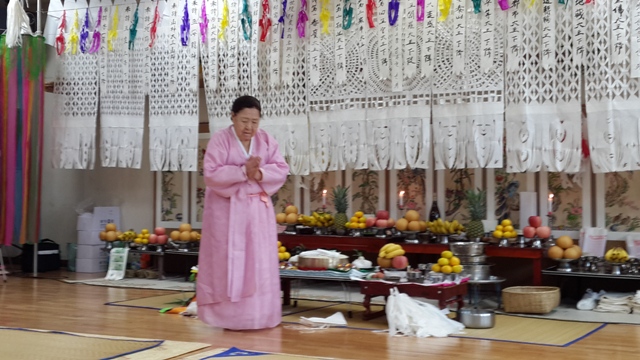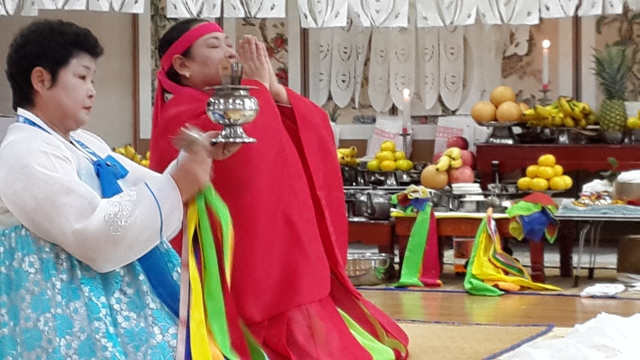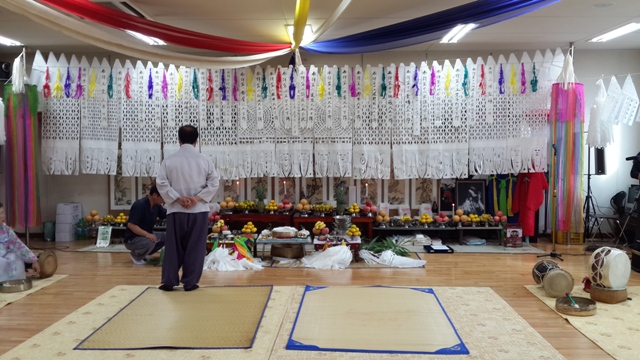| |
 |
|
| ▲ Photography of Shaman Ahn Sa-In at an exhibition in his honor. Photo by Anne Hilty |
The shrine was filled with shamans, both corporeal and ethereal.
A memorial ritual for Ahn Sa-In was held on Saturday, September 28, following a seminar and exhibition on his life the previous day. Ahn (1928-1990) is generally considered to be the father – some even say, savior – of Jeju shamanism.
In the 1970s, under the Park Chung-hee presidential administration and its New Village Movement (Saemaeul Undong) of economic reform, a great cultural violence was perpetuated. In the name of rebuilding the nation's economy in a time of profound devastation and poverty following the war, the Park government ordered its citizens to renounce their traditions and embrace modernity.
By all accounts the program was an economic success; the 'Miracle on the Han' ushered in an unprecedented rate of development over a 30-year span, with Korea currently acknowledged as the world's 15th largest economy (nominal GDP) and as the first recipient-turned-donor within the OECD's Development Assistance Committee (DAC). But at what cost to its people?
Korea today has one of the world's highest suicide rates, with an alarming recent increase in incidence among elders; in a 2012 poll, a full 70% of its workforce reported depression; alcohol consumption is also noted as one of the world's highest. The current 'healing' trend speaks to an acknowledgment of pain.
| |
 |
|
| ▲ 'Grandma Shaman' Lee Sun-nyeo greets the spirits. Photo by Anne Hilty |
Too swift development in a post-conflict society represents enormous stress, multiplied exponentially by acts of cultural violence resulting in the loss of traditional underpinnings.
Shaman Ahn Sa-In stood tall against the government.
In the 1970s shamans, clergy of their faith, were arrested and forced to lay down their religious instruments in a public square, renounce their faith, and declare that they would never practice again. Ahn, a 21st-generation heritage shaman who, unlike most shamans, had achieved a secondary education, remained resolute despite arrest and other persecution. He continued his practice, taught students who passed on his teachings to others, developed a large body of documentation regarding the rituals, and thus saw to it that this indigenous practice continued.
By 1980, having inherited leadership of the Chilmeori-dang (shrine) located on Sarabong, a hill in Jeju City, Ahn formed the Chilmeoridang Society of shamans, and achieved national protection for the annual Chilmeoridang ritual to Yeongdeung, Goddess of Sea and Wind, as intangible cultural heritage. Today the society includes approximately 40 members, and the Yeongdeung ritual internationally protected by UNESCO.
| |
 |
|
| ▲ Main Shaman Lee Yong-ok invokes the spirit of Ahn Sa-In and other departed shamans. Photo by Anne Hilty |
As Shaman Lee Yong-ok performed the ritual's Chogamje, or opening rite, she opened the spiritual pathway between the worlds and invited spirits to join the ritual, a standard practice. She specifically acknowledged the spirit of Ahn Sa-In as was expected, then called forth the spirits of other deceased shamans, individually by name and village, as many of the living shamans wept. She included the recently deceased Jung Gong Chul, with whom the Chilmeoridang society had had a falling-out, in an emotional gesture of reconciliation.
No ordinary ritual for supplicants, this one was for the shamans themselves.
Shamanism is classified as a magico-religious practice stemming from the Altai and Tuva regions of Eastern Siberia, with indigenous forms found throughout the world. A complex animist and polytheistic belief system, it has existed on this island and in mainland Korea for several millenia. Korea is considered one of the few developed nations to retain an active practice of shamanism.
Shamans most often speak of the healing power of their practice not as 'magic' – although, like any religion, they believe utterly in the supernatural – but as 'healing of the mind' or psycho-emotional resolution on individual as well as societal levels. One of the universal features of shamanist traditions is the concept of 'soul loss', particularly as a result of shock, and the need for retrieval.
Ahn, in addition to his resistance against the government's demands that he renounce his faith, also insisted on performing rituals for those who had suffered or were killed during a period of military executions known as 'the 4.3 incident'. As it was illegal to publicly acknowledge the occurrence, such rituals were doubly forbidden. Yet Ahn persisted in order to help 'heal the minds' of the Jeju people in the aftermath of their terrible trauma.
| |
 |
|
| ▲ Grand Shaman Kim Yoon-su contemplates the altar to Ahn Sa-In. Photo by Anne Hilty |
Grand Shaman Kim Yoon-su is the spiritual descendant of Ahn and the current leader of the Chilmeoridang Society. In a poignant moment, Shaman Lee, who is also Kim's wife, became the channel for Ahn's spirit; through her, Ahn spoke directly to Kim and then to two other shamans who had been Ahn's students, acknowledging and encouraging them.
“Everything we are, we owe to you,” intoned Lee, in honor of Shaman Ahn Sa-In. “It is because of you that we are still able to practice, to help others, today.”
---
Dr. Hilty is a cultural psychologist and co-author of an upcoming book on Jeju goddess mythology; from New York, she now makes Jeju Island her home.
|























